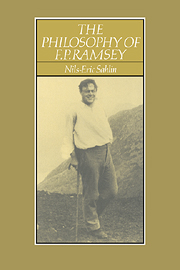Book contents
- Frontmatter
- Contents
- Preface
- Acknowledgements
- INTRODUCTION
- Chapter 1 PHILOSOPHY OF PROBABILITY
- Chapter 2 BELIEF AND TRUTH
- Chapter 3 KNOWLEDGE
- Chapter 4 GENERAL PROPOSITIONS AND CAUSALITY
- Chapter 5 PHILOSOPHY OF SCIENCE
- Chapter 6 LOGIC AND MATHEMATICS
- Chapter 7 RAMSEY'S THEOREM
- Chapter 8 UNIVERSALS
- Chapter 9 ECONOMICS
- Chapter 10 BIOGRAPHICAL GLIMPSES
- Notes
- Bibliography of F. P. Ramsey's works
- Index of names
Chapter 4 - GENERAL PROPOSITIONS AND CAUSALITY
Published online by Cambridge University Press: 18 September 2009
- Frontmatter
- Contents
- Preface
- Acknowledgements
- INTRODUCTION
- Chapter 1 PHILOSOPHY OF PROBABILITY
- Chapter 2 BELIEF AND TRUTH
- Chapter 3 KNOWLEDGE
- Chapter 4 GENERAL PROPOSITIONS AND CAUSALITY
- Chapter 5 PHILOSOPHY OF SCIENCE
- Chapter 6 LOGIC AND MATHEMATICS
- Chapter 7 RAMSEY'S THEOREM
- Chapter 8 UNIVERSALS
- Chapter 9 ECONOMICS
- Chapter 10 BIOGRAPHICAL GLIMPSES
- Notes
- Bibliography of F. P. Ramsey's works
- Index of names
Summary
Ramsey abandoned logicism in 1929 for a finitistic view of mathematics (see Chapter 6). Behind this conversion lay his dissatisfaction with the axiom of infinity of set theory. However, it was not only Ramsey's view of mathematics that evolved during the period between 1926 and 1929 but his whole philosophical outlook. The advances in logic led the majority of British philosophers into fresh fields of research. The inter-war years were characterized by a more pragmatically biased philosophy. Ramsey was not unaffected by these currents. He read Peirce, was influenced by Johnson and turned increasingly toward pragmatism. The first sign of this change in Ramsey's philosophy is to be seen in ‘Truth and Probability’ (1926). This essay is imbued with the pragmatism of Peirce, although Wittgenstein's strong impact is still very noticeable and the mathematical elegance is there as always.
In this section we discuss some of the problems Ramsey was pondering during the period 1926–9. In some cases he presented complete solutions to a philosophical problem, but very often he only sketched a proposal for a solution. Things would have turned out quite differently had Ramsey lived longer than he did. Some of the ideas which Ramsey had and which proved extremely rewarding were only mentioned by him in passing.
[W]e must now say something about general propositions such as are expressed in English by means of the words ‘all’ and ‘some’, or in the notation of Principia Mathematica by apparent variables. […]
- Type
- Chapter
- Information
- The Philosophy of F. P. Ramsey , pp. 102 - 124Publisher: Cambridge University PressPrint publication year: 1990

